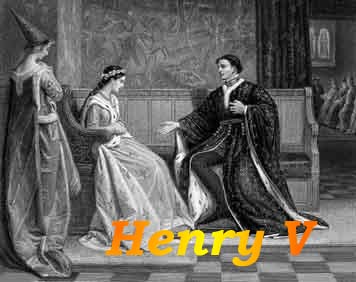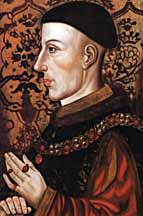|
 |
 |
| Henry V |
| 作者Author / William Shakespeare 威廉.莎士比亞 |
 |
|
Henry
V
|
|

Source
of image with Analysis; from Shakespeare
Illustrated
W.
F. Yeames. The Wooing of Henry V.
|
| |
|
Introduction
|
| |
Henry V is a
study of kingship, patriotism and heroic determination, tempered by
tender comedy as Henry courts Katherine, Princess of France”
Quote from
http://www.arkangelshakespeare.com/henryV-1.html
Henry V is
considered Shakespeare's most famous war play, and the most interesting
biographical account of the English monarchy. The story revolves around
the life of King Henry V (Hal), the young rebel prince from
the Henry IV plays, who has become the King of England and gains heroic
recognition for his defeat of the French at Agincourt. While the
Henry IV plays deal with the grooming of Prince Hal, Henry
V displays the results of his upbringing. King Henry is a
cunning and shrewd military leader whose ruthless pursuit to overtake
France is no less victorious than his desire to seduce the French
Princess Katherine for his bride. The spirit of King Henry and his
tireless ambition are proven in such famous speeches as his Saint
Crispin's Day address to the troupes before going to battle. The play
explores King Henry's struggles to overcome his past and the sins of
his predecessors.
Quote from http://www.shakespeareinthepark.vt1.com/history/1998/henryv.htm
|
| Synopsis
|
| |
ACT 1
Scene 1.
The Archbishop of Canterbury and the Bishop of Ely are anxious about a
bill proposing to confiscate ecclesiastical property. They are,
however, optimistic that King Henry will oppose it. They note that
since the death of his father young Henry is a
reformed character, no longer a rakish debauchee, but a gracious king.
Canterbury has promised Henry a contribution from the clergy if he
pursues the French crown, to which he has a claim through his
great-grandmother, Isabella of France.
Scene 2.
Wishing to establish the justice of his claim Henry asks the Archbishop
to expound the Salic Law which prohibits succession to the French
throne through the female line. The Archbishop assures Henry that he
can press his claim "with right and conscience". Ambassadors from the
Dauphin are admitted. They present Henry with a gift of tennis balls;
angered, he warns them: "I am coming on/To venge me as I may".
ACT II
Scene 1.
Nym, Bardolph, Pistol and Mistress Quickly meet on the street. Nym and
Pistol were rivals for Quickly's hand; Pistol having won the contest,
Bardolph reconciles them.
Scene 2.
Henry meets the Earl of Cambridge, Lord Scroop and Sir Thomas Grey who
have conspired with the French against his life. Not knowing that their
treason has been discovered, they urge harsh measures against a man
convicted of speaking against the King. When Henry orders their arrest,
however, they beg for forgiveness. They are sentenced to death.
Scene 3.
Pistol, Nym, Bardolph and Mistress Quickly mourn the death of Falstaff.
Quickly is sure that the Knight made a Christian end; the others are
less convinced. They bid her farewell and set off for France.
Scene 4.
In the French Palace the Dauphin describes Henry as "a vain, shallow,
humorous youth", but the Constable warns against underestimating him.
Exeter arrives and demands that Charles the French King give up his
throne to Henry.
ACT III
Scene 1.
Having rejected the French King's offer of his daughter Katherine and
some minor dukedoms, Henry lays siege to Harfleur. He urges his troops
"once more unto the breach, dear friends!".
Scene 2.
Bardolph, Nym, Pistol and their Boy are reluctant to join the battle,
but Fluellen drives them on. Fluellen tries, unsuccessfully, to engage
the truculent Macmorris in discussion about the disciplines of war.
Scene 3.
Harfleur surrenders to the English when the Dauphin fails to
send help to the town.
Scene 4.
Princess Katherine is given an English lesson by her
attendant Alice.
Scene 5.
The English are marching towards Calais and Charles urges his
men to prepare for battle.
Scene 6.
Pistol tells the Welsh Captain Fluellen how Bardolph is to be
hanged for looting. When Fluellen refuses to intercede for him with the
Duke of Exeter, Pistol is furious. Fluellen describes to Henry how
Exeter has succeeded in defending the bridge. Montjoy, the French
Herald, enters with the demand that Henry consider being ransomed.
Henry is adamant that though his forces are weakened, he will lead them
into battle.
Scene 7.
At Agincourt, the Dauphin, Orleans and the Constable wait impatiently
for dawn.
ACT IV
Scene 1.
Henry disguises himself as a common soldier and walks through the camp.
He meets Williams who believes the King will have to bear the sins of
those killed in battle if the cause is not a just one. Henry disagrees
and he and Williams exchange gloves; these they will wear in their hats
so as to be able to recognize one another and continue the
argument at a later time. Left alone, Henry ponders the burden of
kingship. He begs God for protection in battle and expresses shame at
the way his father took the crown from Richard II.
Scene 2.
The French are jubilantly confident as they prepare to enter battle.
Scene 3.
The English are anxious about the impending battle:"`Tis a fearful
odds." It is St Crispin's day and Henry rouses the spirits of his
troops by imagining the pride of the survivors when they look back on
their victory. Montjoy arrives, urging the English to surrender, but
Henry is determined: they will fight.
Scene 4.
Pistol captures a French soldier but agrees to spare his life
for a ransom.
Scene 5.
The French are distraught as they realize that their ranks
are broken.
Scene 6.
Exeter recounts to Henry the heroic deaths of York and
Suffolk.
Scene 7.
Fluellen and Gower discuss Henry's bravery and his Welsh origins.
Montjoy asks permission for the French to retrieve and bury their dead.
He concedes that the English have won the day. Having come across
Williams who still has the King's glove, Henry gives Williams' glove to
Fluellen, telling him that whoever challenges it is his enemy. Williams
accosts Fluellen and strikes him. The King pardons Williams. A Herald
arrives with news that there are many French dead; the English,
however, have lost few men.
ACT V
Scene 1.
After his victory Henry offers a peace treaty to the French. Fluellen
strikes Pistol for deriding Wales. Pistol has learned that his wife is
dead; he will return to England.
Scene 2.
In the presence of both kings, the Duke of Burgundy speaks of the
blessings of peace. Henry woos the French King's daughter. Charles
agrees to the English terms for peace and gives Katherine to Henry,
making him heir to
the French throne.
From http://www.arkangelshakespeare.com/henryV-1.html
|
|
Biography
of Henry V 
|
| |
Henry was probably brought
up under the care of his uncle, Henry Beaufort. He was knighted by
Richard II in 1399 and created prince of Wales when his father usurped
the throne in the same year. With his father, with Sir Henry Percy, and
later by himself, he led armies against Owen Glendower in Wales and
there gained valuable military and administrative experience. Although
wounded, he figured largely in the royal victory over the Percys at
Shrewsbury (1403).
Henry
began (c.1409) to work actively in the privy council, which he and his
friends dominated in 1410–11. In favoring the Burgundians
rather than the Armagnacs in France (see Armagnacs and Burgundians), he
disagreed with the king, and a suggestion by his followers that he
should succeed immediatelyn to his father's throne led to his dismissal
from the council (1411). He became king, however, upon his father's
death in 1413.
Reign
Upon
his accession to the throne, Henry dismissed the incumbent ministers
and made Henry Beaufort lord chancellor. A rebellion by the Lollards,
led by Sir John Oldcastle, resulted in a strong parliamentary statute
(1414) against the sect, but trouble continued intermittently until the
execution of Oldcastle in 1417. Determined to regain the lands in
France held by his ancestors, Henry arranged a secret pact
with Burgundy and prepared to attack France, thus reopening the Hundred
Years War. Launching his first invasion in 1415, he laid successful
siege to Harfleur and marched toward Calais, having announced his claim
to the throne of France. He met and defeated a superior French force in
one of the most famous battles of English history at Agincourt (1415).
The enthusiastic acclaim that Henry
received for this victory for the time overshadowed English political
and economic unrest. Henry formed (1416) an alliance with Holy Roman
Emperor Sigismund and extended his agreement with the Burgundians. In
1417 he led another expedition to France. In 1419, Rouen capitulated,
and Normandy was in English hands. In 1420, Henry concluded the Treaty
of Troyes, by which he agreed to marry Catherine of Valois
and to rule France in the name of her father, Charles VI, who accepted
Henry as his successor.
The
English king continued his conquests to consolidate his holdings and
late in 1420 entered Paris. The following year he returned with his
wife to England, there made further military preparations despite
considerable popular opposition to the continuation of war, and
embarked on his third invasion of France. After a year of minor
victories, he fell ill and died in Sept., 1422.
Character and Legacy
Henry
abandoned his early recklessness (celebrated and probably exaggerated
by Shakespeare) and ruled with justice and industry. He lifted England
from the near anarchy of his father's reign to civil order
and a high spirit of nationalism. His main interest, however, was in
gaining control of lands in France lands that he sincerely
believed to be his right. He
exhibited military genius,
characterized by brilliant daring, patient strategy and diplomacy, and
attentiveness to detail. His strong personality, his military
successes, and his care for his less fortunate subjects made him a
great popular hero. The wars, however, placed the crown further in debt
and left the nation with economic and military problems that could not
be met in the reign of his son, Henry VI.
Bibliography
See
biography by H. F. Hutchison (1967); E. F. Jacob, Henry V
and the Invasion of France (1947, repr. 1963); K. H.
Vickers, England in the Later Middle Ages
(7th ed. 1950); V. H. Green, The Later Plantagenets
(1955); M. W. Labarge, Henry V: The Cautious Conquerer
(1976); G. L. Harriss, ed., Henry V: The Practice
of Kingship (1985).
The
Columbia Encyclopedia, Fifth Edition Copyright 1993,
Columbia University Press. Licensed from Inso Corporation. All rights
reserved.
|
| |
| |
|
| |
|
|
| |
|
|
|
|
|
|
|
|
